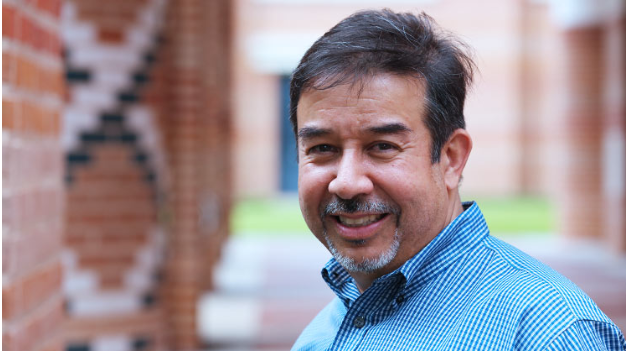Use lastest version of Chrome, Firefox or Safari to improve the Experience




September 28, 2018
Our CEO is a proud member of the Rice University alumni and staff. He has been honored with an article (https://engineering.rice.edu/hector_klie) that describes his long-standing commitment to find novel solutions for Oil and Gas problems.
We reproduce this article below.
Kudos Hector!

Hector Klie has a series of unfortunate events in his home country to thank for DeepCast.ai, the artificial intelligence solution company he founded in Houston in 2017.
For fourteen years he worked as a research scientist for the state oil and natural gas company, Petróleos de Venezuela, S.A. (PVDSA), in his native Venezuela, a nation with the world’s largest proven oil reserves.
In 2003, because of unfortunate political and economic events in Venezuela, he and other professionals were encouraged to find employment opportunities abroad. Klie, 54, who earned his Ph.D. in computational engineering and science from Rice in 1996, tries to be philosophical about his decision and the fate of Venezuela. He shakes his head and says: “My country could be so wealthy. We could all have a good life. For the future of my family, I had to move on.”
Klie was born in Venezuela’s capital, Caracas, the son of a dentist. At age 15 he earned a two-year scholarship to study at Lester B. Pearson United World College of the Pacific in Victoria, British Columbia. There, he studied high-level math, physics and chemistry and, for the first time, he used a personal computer.
“That’s when I knew I wanted to be an applied mathematician and a computational scientist”. There were 200 students from more than 50 countries. I learned the value of education as a way to achieve understanding and respect. During my first Christmas, I stayed with a Canadian family who helped me to improve my English. I played Boggle almost every day. I stay in contact with them. They are like family to me,” Klie said.
He went on to earn B.S. and master’s degrees in computer science and engineering, in 1988 and 1991, respectively, from Universidad Simón Bolívar in Caracas.
At Rice, Klie’s adviser was Mary Wheeler, who in 1971 had become the second woman at Rice to earn a Ph.D. in mathematics. After teaching at Rice for 24 years, in what eventually became known as computational and applied mathematics, Wheeler moved in 1995 to the University of Texas at Austin, where she is the Ernest and Virginia Cockrell Chair in Engineering.
Klie’s 22-year-old doctoral thesis at Rice, “Krylov-secant methods for solving large-scale systems of coupled nonlinear parabolic equations,” is still quoted in the literature. “Oh, yes, Hector made fundamental contributions to the field. It’s quoted a great deal. He’s well-known in the petroleum industry,” Wheeler said.
“Venezuela’s loss is our gain,” she added.
While working for PVDSA, Klie was also teaching in the Scientific Computing and Statistics Department at Simón Bolívar. When he decided to leave his country in 2003, Wheeler invited him to become associate director of the Center for Subsurface Modeling at UT. He remained there for almost five years, producing research focused on linear solvers and preconditioners, optimization, reduced-order models and uncertainty quantification. He received research grants from the National Science Foundation and the U.S. Departments of Energy and Defense.
“I owe much to Mary. She was very generous and supportive in allowing me to expand my technical capabilities and networking,” said Klie, who in 2008 left the university to go to work as a staff reservoir engineer at ConocoPhillips, based in Houston.
“I worked to develop improved simulation capabilities via parallel solvers on multicore and GPUs, data-driven methods for efficient reservoir management, and for production forecasting and drilling operation workflows. The industry was demanding new advances for integrating more data and making models more adaptable to multi-physics scenarios,” he said.
Throughout his career, Klie has developed algorithms to help interpret the seismic waves exploration crews send into the earth. In this way, oil companies hope to measure the geological structures in the earth’s subsurface and reduce the need for expensive exploratory drilling.
In 2015, Klie was promoted to lead data scientist in advanced analytics at ConocoPhillips, and a year later he moved to the Sanchez Oil & Gas Corp. as its director of enterprise data solutions. After a year, he decided it was time to act on a long-deferred dream: starting his own company.
In April 2017, Klie founded DeepCast.ai with his son, Arturo, 29, as the company’s chief technical officer and senior software engineer. Arturo had earned a B.S. in computer science from the University of Houston and previously worked for Microsoft as program manager for the Bing advertising engine team. “Together, we aim to unlock the potential of machine learning, big data, optimization and cloud computing for the oil and gas industry and beyond,” he said.
“I have been very fortunate to count on a supportive family and to be surrounded by talented friends and colleagues. There have been difficulties but I’ve always had people who trusted my abilities and wanted to help me along the way. I want to give back a little of what I have received,” Klie said.
With his company thriving, Klie decided to take a job as an adjunct professor in CAAM at Rice. “I want to share my industrial experience with students and help them to be better prepared for the data automation society that is rapidly evolving in front of us,” he said.
Klie has been married for more than 30 years to Dulce Tejeira, who is a dentist. They have another son, Alberto, 28, who graduated in advertising and sales from the University of Houston. “Alberto has a unique leadership skill to persuade and communicate effectively. Perhaps he will eventually join the DeepCast.ai team,” Klie said.
Patrick E. Kurp, Engineering Communications, Rice University
